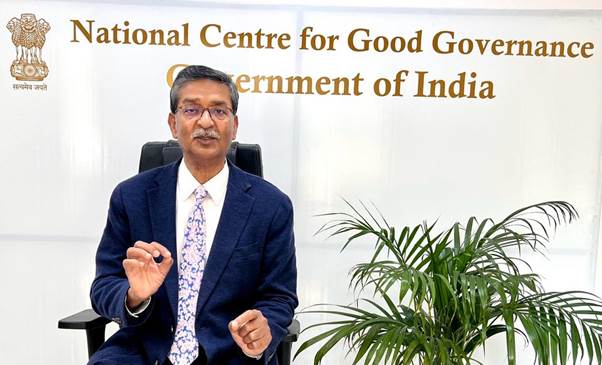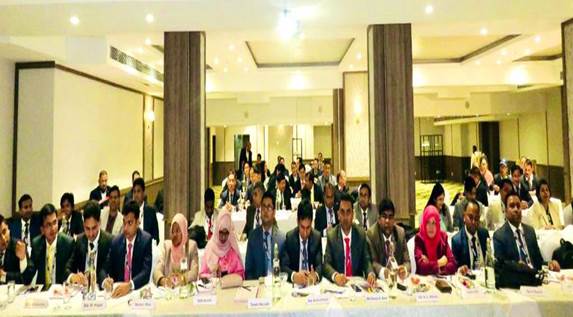Two capacity-building programmes for the civil servants of Bangladesh (57th batch with 40 participants) and Arunachal Pradesh (2nd batch with 29 participants) commenced at the National Centre for Good Governance (NCGG), Mussoorie campus. NCGG organized joint sessions to facilitate knowledge and experience sharing.
The National Centre for Good Governance (NCGG) is dedicated to promoting collaboration and learning among civil servants in India and neighbouring countries, in line with the ‘Vasudhaiva Kutumbakam’ philosophy espoused by Prime Minister Shri Narendra Modi. NCGG’s capacity-building initiatives for civil servants aim to promote good governance, enhance service delivery, and improve the quality of life of citizens by reaching the last person.
Shri Bharat Lal, DG, chaired the joint inaugural session wherein he emphasized the crucial role of civil servants in providing efficient public service delivery. He highlighted the importance of creating an enabling environment for citizens to realize their potential by improving infrastructure, services and facilities. The DG urged officers to share their experiences and learnings, which could be further fine-tuned by other officers for the benefit of people and implemented in other areas. The session provided an opportunity for mutual learning and knowledge sharing between participants from Arunachal Pradesh and Bangladesh, with an aim to achieve sustainable development goals and facilitate good governance.

The capacity building programme comprises sessions on topics such as public policy and implementation, digital governance, revitalizing rivers, a centralized public grievance redressal system, innovative education outcomes, rural housing, project planning, execution and monitoring, shifting governance paradigms, fintech and inclusion, planning and constructing eco-friendly smart cities through case studies, gender and development, anti-corruption strategies, investment promotion and entrepreneurship, decentralized municipal solid waste management, and health governance in India, among other important areas. Moreover, the programme offers exposure visits to Pradhan Mantri Sanghralaya, Indian Parliament, and other locations for participants.
In 2022, the National Centre for Good Governance (NCGG) signed an MoU with the Government of Bangladesh to enhance the skills of 1,800 civil servants by 2025. Another MoU signed in the same year aims to develop the capacity of civil servants in Arunachal Pradesh. By improving the capacity of civil servants, delivery in terms of policy reforms, infrastructure, and services can be further enhanced. Moreover, enhancing the capacity of civil servants will strengthen the overall governance and contribute to the sustainable development of the region.
Established by the Government of India in 2014, the National Centre for Good Governance serves as the country’s premier institution for promoting good governance, policy reforms, and capacity building of civil servants within India and in other developing nations. It also functions as a think tank. In partnership with the Ministry of External Affairs, NCGG has provided capacity-building training to civil servants from 15 developing nations, including Bangladesh, Kenya, Tanzania, Tunisia, Seychelles, Gambia, Maldives, Sri Lanka, Laos, Vietnam, Bhutan, Myanmar Afghanistan, and Cambodia. Participants from various countries found the training to be highly beneficial. Additionally, NCGG has been actively involved in enhancing the capacity of state civil servants in different parts of India, earning recognition for its content and delivery. Due to increasing demand, NCGG is expanding its capacity to accommodate a larger number of civil servants from more countries in focused areas.

Dr. A.P. Singh, the Course Coordinator for Bangladesh, Dr. B.S. Bisht, the Course Coordinator for Arunachal Pradesh, Dr. Sanjeev Sharma and Dr. Mukesh Bhandari, the Associate Course Coordinators, and the faculty of NCGG Campus, Mussoorie attended the session. The training team for both programs was also present during the session.





